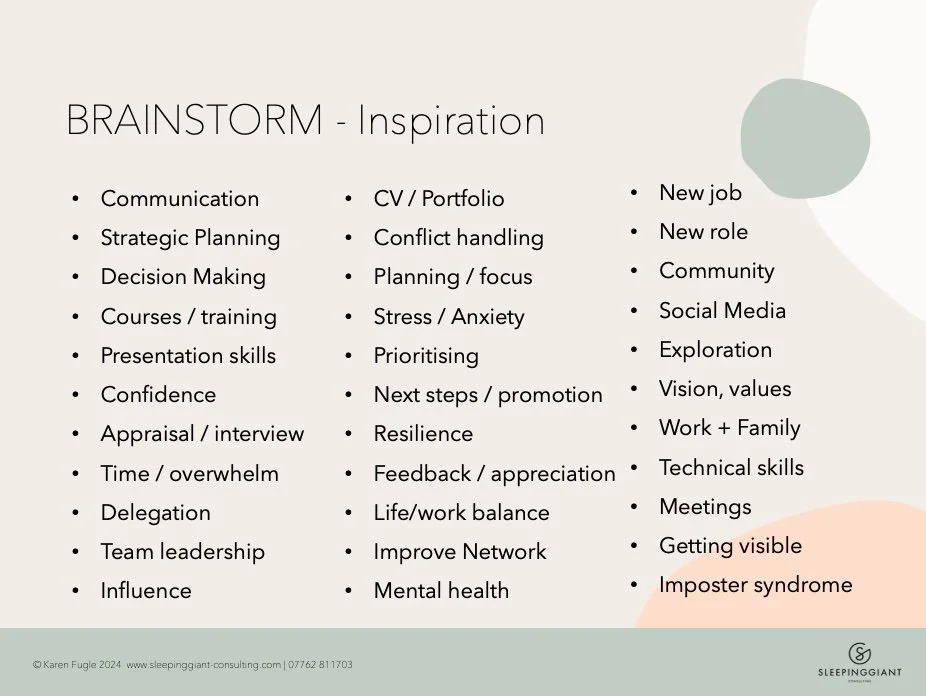WIA Mentoring Program 2024 off to a Great Start!
In January, Karen Fugle, Leadership Coach and WIA Committee member, hosted a highly attended Goal Setting workshop to help you get clear on your goals so that your mentoring starts with strong foundations. Here are the highlights:
The Eight Steps to Goal Setting Success:
1. Choose Your Goals: Begin with self-reflection, to identify what brings you joy, satisfaction, and a sense of purpose in your professional role. Take note of these tips:
Focus on areas where you have control over the outcome.
Reflect on both your personal life and professional career when setting your goals.
Strike a balance between daunting goals (BHAGs - big hairy audacious goals) and those easier or quicker to achieve.
Frame your goals positively, focusing on improvement rather than avoidance. For example, "Improve my team delegation skills" instead of "Don't micro-manage."
Be specific with your goals. For instance, "Gain confidence in speaking up at networking events" is better than the vague "gain confidence."
2. Visually Map your Goals: When you can see what you need to do, you naturally become more motivated to achieve it. Karen recommend’s using a Goal Wheel. It's a fantastic way to keep important issues at the forefront of your mind and assess their impact in relation to each other.
3. Prioritise then Focus: Narrow down and prioritise your top three goals for better results. Choose the ones that require urgent attention or give you the most career leverage in the long term. Remember to ask yourself these questions for each of your chosen goals:
What does success look like?
Why is this goal important to me?
What is my motivation for achieving this goal?
4. Resources and Support: Think about what you need to achieve your goals. What will help you, and where are the gaps? Consider your capabilities, strengths, and skills, as well as your mindset, confidence level, and support network. Do you need something specific, like time, money, energy, or advice? Or perhaps you need training, cutting-edge technology, the right process, or someone to hold you accountable?
5. Break it down: Think about what you need to do to accomplish your goal. What are the specific milestones that you can hit? For instance, if your goal is to get visible to senior leaders, then the milestones might be:
Chair the weekly team meetings
Create a social media presence
Ask three leaders for a mentoring coffee
Join a committee
6. Get out or your own way: the most significant barrier in our way is most likely ourselves! Self-sabotaging inner thoughts sound like this:
The self-sabotage might also be practical - you don’t calendar in the time, you put other people’s tasks before your own, or you get bogged down in detail. Think about how you have self-sabotaged in the past and what can you learn from those experiences.
Everything has to be perfect.
Other people are better at this than me.
I don’t have enough confidence.
I've no right to be in this role /room /job
7. Measure Sucess: Regular reviews will keep you on target and motivated. Don't hesitate to redraw your goal wheel at critical points, as you find that goals change or get refined further.
8. Celebrate success: You may not be used to celebrating your own work, but appreciate that it’s essential for building self-esteem, confidence (and eliminating imposter syndrome!). Set rewards along the way as something to look forward to, especially if you find yourself lacking motivation.
Credit: Karen Fugle
If you missed this worthwhile workshop then you can watch the recording: https://us06web.zoom.us/rec/share/325Y0LcZb2kVNP2yqMxD-Y9NyBVvbnDjyCbS3Pm-hTX86gD7mP8L06X--nBVyz-d.wEzi3XzwsdTO0gFz
Passcode: %AcZC@3y
NOTE: We do apologise for the recording starting about 10mins into the session.
The full downloadable workbook on Goal Setting Success is available from Karen’s website with a 20% discount this month only.



